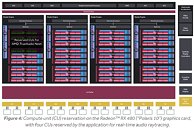Thursday, August 18th 2016

AMD Develops TrueAudio Next to Compete with NVIDIA VRWorks Audio
AMD is developing a new GPU-accelerated audio pipeline to rival NVIDIA VRWorks Audio, the TrueAudio Next. The company will take this technology to the developers through its GPUOpen initiative. TrueAudio Next will bolster AMD's VR technologies portfolio, with a hardware-accelerated real-time "audio ray-tracing" pipeline that adds realism to sound in a 3D scene by computing how sound waves interact with the various objects in it. This is essentially what NVIDIA's VRWorks Audio does.
At the silicon level, processing the interaction between sound and surfaces in a 3D scene takes significant amount of compute power. On AMD "Polaris" architecture GPUs, such as the Radeon RX 480, TrueAudio Next will take advantage of Compute Unit Reservation, a feature which allows apps to temporarily reserve a portion of the GPU's CUs. Real-time positional audio DSPs such as TrueAudio Next and VRWorks Audio are expected to gain prominence with VR games, as CPU-based procedural audio-pipelines can't keep up with the faster inputs of a VR HMD to changing the 3D scene, than conventional input devices. Accelerated audio pipelines are needed to ensure that the audio output is fluidly in-sync with the video output, to avoid affecting realism.
At the silicon level, processing the interaction between sound and surfaces in a 3D scene takes significant amount of compute power. On AMD "Polaris" architecture GPUs, such as the Radeon RX 480, TrueAudio Next will take advantage of Compute Unit Reservation, a feature which allows apps to temporarily reserve a portion of the GPU's CUs. Real-time positional audio DSPs such as TrueAudio Next and VRWorks Audio are expected to gain prominence with VR games, as CPU-based procedural audio-pipelines can't keep up with the faster inputs of a VR HMD to changing the 3D scene, than conventional input devices. Accelerated audio pipelines are needed to ensure that the audio output is fluidly in-sync with the video output, to avoid affecting realism.

20 Comments on AMD Develops TrueAudio Next to Compete with NVIDIA VRWorks Audio
Then I read this bs for VR....sigh.
Come on people, gaming is an audio video experience, why do we so ignore 50% of that experience :(
EDIT: Oh, and I'm still having fun with an X-Fi card on my current machine thanks to ALchemy... FEAR is as amazing as ever.. when it's not stalled to 30fps because of bullshit mouse driver related bugs...
And as for the gaming industry, it's not like they didn't have to completely retool parts of their engine over the years.. DX7->8, DX9->10/11, DX11->12.. IPX to TCP/UDP/IP, joystick to XInput.. the list goes on, but pretty much nobody but Codemasters and DICE cared enough at the time.
Medal of Honor had amazing sound as well, iirc.
Is so incredibly frustrating how MS managed to ruin everything and completely utterly destroyed the sound for PC games.
Also, will this work on older GCN cards? Would be nice for all the people with those.
already out in open source form with MIT license